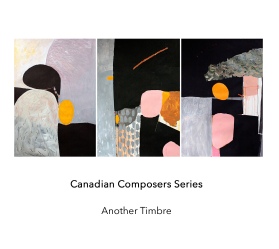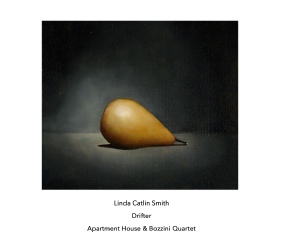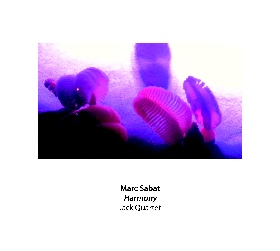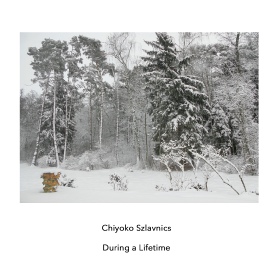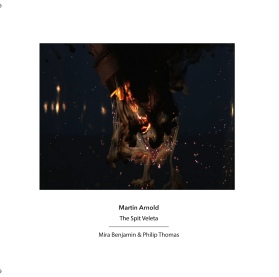Another Timbre TimHarrisonbre
Profile of Another Timbre in Musicworks magazine,
autumn 2017 by Julian Cowley
“I earn my living as a sound recordist on TV programs,” Simon Reynell relates. “I don’t put creative energies into that, but it’s well paid, so I don’t have to work more than an average of six days a month, which allows me to spend most of my time on the label, doing the things I want to do.” That label, which Reynell has run for ten years from his home in Sheffield, South Yorkshire, is Another Timbre, a project that faithfully reflects his personal musical preferences. “The label’s trajectory,” he observes, “has shifted from textural improvisation towards experimental composed music that engages with melody and harmony. Almost all the music I like falls somewhere on that spectrum, but my taste is shifting; I don’t know where it will be in another five years.”
The most recent departure is a Canadian Composers Series, launched with a batch of five releases featuring music by Linda Catlin Smith, Marc Sabat, Chiyoko Szlavnics, Isaiah Ceccarelli, and Martin Arnold. It’s a diverse grouping, but Reynell feels that their music fits comfortably into the current profile of Another Timbre. Before alighting on the idea of a series, he had already discussed with Smith, Arnold and Sabat the possibility of producing portrait discs.
Pianist Philip Thomas and Canadian violinist Mira Benjamin, both based at the University of Huddersfield and both members of the audacious chamber ensemble Apartment House, had recently recommended Martin Arnold’s work. “Getting to know musicians has been one of the great pleasures of running Another Timbre,” Reynell acknowledges. “For decades I didn’t know anyone who shared my tastes, so it was a lonesome passion. If experimental musicians tell me I should hear this or that composer’s work, I’ll give it a good listen, even though I may not end up sharing their enthusiasm.”
When he heard Thomas and Benjamin playing three pieces by Arnold, deliberately evasive and meandering variations on dance forms, Reynell was persuaded to record those pieces, now released on The Spit Veleta (at106). Marc sabat’s music had registered on his radar for some time before he actually met the composer in 2015, at the Huddersfield Contemporary Music Festival, where Euler Lattice Spirals Scenery, Sabat’s harmonically vibrant string quartet in just intonation, was being performed.
Concerts with adventurous programmes, staged locally, have been an invaluable asset for the curator of a low-budget and independently minded label. His ability to make high quality recordings is another essential factor. “I never trained formally as a sound recordist,” he notes. “I drifted into it about 35 years ago. Obviously I have a lot of experience, but recording music is different from TV. I’m still learning plenty of things.”
When Reynell first heard Linda Catlin Smith’s music several years ago, it seemed too romantic for his taste. “After a while I realized that this was largely because of the way it is performed by classical musicians. Linda sent me a recording of Dirt Road, which reinforced my sense that, played by musicians from an experimental background, her music might sound sparer and, to me, more appealing. So I sent that score to Mira and last year we released her recording of Dirt Road, with percussionist Simon Limbrick. It is far stronger, I think, and di well in terms of sales. I’ve just had it re-pressed.”
Such success might be modest in commercial terms but, as Reynell points out, it keeps Another Timbre afloat. “I’ve always wanted to release just the music I’m most interested in at the time, regardless of how many copies it might sell. Up to now the label has sold just enough that I can get the next discs pressed without getting involved with grant funding. Still, musicians take time to learn and rehearse, and have to be paid. Often there are only a handful of players who can really do the job well.”
Drifter, a selection of Smith’s music performed by members of Apartment House and Montreal’s Quatuor Bozzini, is the initial release in the new series and it is already selling well. Reynell’s hope is that inquisitive listeners will delve further and discover the shimmering, swerving and pulsating tones of Szlavnics or the brittle, haunted harmonies of Ceccarelli’s music. “Except for a handful of distributors, the Cds are sold via the label’s website. I keep reviewing this approach as Cds become marginal to most people’s lives. Perhaps in a few years it will all be downloads, but I don’t like downloads. With specialist music like this I don’t think it’s necessarily a bad thing that you have to seek it out.”
The sleeves that encase Another Timbre releases have settled into an elegant format, now integral to the label’s identity. “When I started I thought covers didn’t matter,” Reynell admits. “Some of the early releases looked messy, but I soon learned that both musicians and listeners wanted something better. I asked my son Evan Gray, who studied at Glasgow School of Art, to design a template. It worked well. Musicians come up with an image that can be slotted onto the cover; the rest is more or less fixed. These sleeves have a minimalist feel, but people interested in reading about the music can find information on the website. I feel people should be able to listen without thinking in verbal terms, but I had some interesting conversations while preparing the Canadian series, and thought it would be good to pull some of these together.”
The result is a substantial booklet containing illuminating interviews with all five composers, plus Cassandra Miller, Alex Jang, and Lance Austin Olsen, whose music will feature in a second instalment of the Canadian Composers Series. Reynell sends this booklet to any purchaser of two or more of the discs. “I was puzzled as to whether there were common threads linking their various musics, or anything that defined them as Canadian. It’s still an open question, as afra as I’m concerned, but the interviews do keep coming back to certain themes or issues, even if each composer has a different set of answers.”
Julian Cowley, Musicworks, autumn 2017
